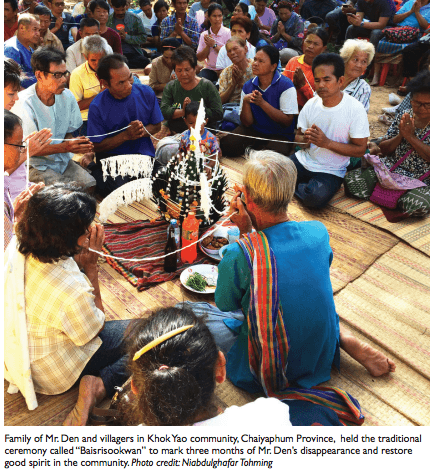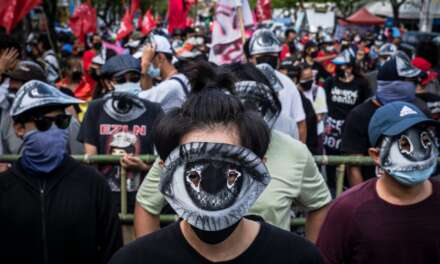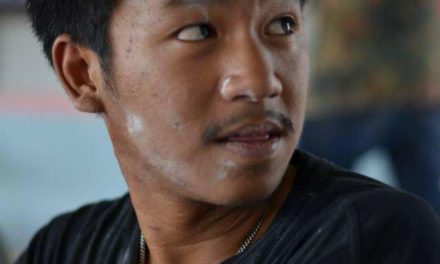“[Mr.] Den is not going anywhere, he is always with us, in our heart” said the sister of Mr. Den Kamlae, a land rights defender who has been missing since 16 April 2016, during a traditional ceremony held in June to mark three months since his disappearance. The family and villagers believe that local officials are involved in Den’s disappearance as a result of his activism and involvement in the community’s dispute with the national park department on land issues. Meanwhile, proper investigations by the authorities have been delayed and his family has yet to receive justice.
Mr. Den’s disappearance reflects the current situation of land and environmental right defenders who are facing threats, and reaffirms the prevalent culture of impunity in Thailand. In recent years, the struggles of landless villagers, indigenous peoples, urban and rural poor and frontline communities have often been met with violence in the form of physical attacks, killings, enforced disappearance, burning and destruction of houses and property, mandatory attitude adjustment, and the use of SLAPP1 against activists and community members.
These human rights violations are deliberately committed by state security officials and private security forces. It is argued that these abuses are directly linked to policies on land and natural resources, as well as investment and development policies that are promoted and pursued by the government. This article will discuss and highlight the current human rights situation related to land and natural resources, the threats and challenges facing land rights defenders, and their strategy to respond to the situation..
Policies on Land and Marginalized Communities
Immediately after taking control of the country in May 2014, the military government introduced the so-called “Forestry Master Plan (FMP),” along with legal instruments to put an end to forest destruction, trespassing on public land and to improve sustainable management of natural resources. Additionally, it aims to increase forestry land through a joint army-led operation with harsh measures against alleged encroachers.
According to the report from the military unit, Internal Security Operation Command (ISOC), from June 2014 to February 2015, 1,013 people have been arrested and prosecuted for illegal logging and encroachment. Although there is no clear figure of how many of those arrested were large scale landlords or big corporations, testimonies have shown that the majority of those arrested are poor farmers, marginalized and landless people who are entitled to the protection that the Plan seemingly intend to provide.
Under this plan, state security forces are granted the authority to subjugate people. This results in the arbitrary and forceful eviction of many rural and urban poor and forest-dependent communities from their lands and properties, and the destruction of housing and agricultural products. There are a number of human rights violations that have been reported, but the perpetrators have rarely been brought through the justice system.
In Chaiyaphum province, a northeastern part of Thailand, local authorities had notified at least eight communities to move out from the disputed lands. However, they resisted and asserted their rights to remain in the land until the dispute is resolved. Villagers coming together to unite in the collective struggle have been seen as a threat by the state officials. According to villagers, local government officials have been trying to break community cohesion through manipulation and the creation of distrust among the villagers by spreading false information. The leaders of the community have been threatened and followed, and local authorities have monitored collective activities.
It also appears that investors who are in dispute with villagers over land have seized the opportunity to use force against local people to evict them from the land. In the case of a sea gypsy community in Phuket, they were attacked and ambushed several times, at night and daytime, by private security forces that were explicitly connected to the resort business, which led to a number of local people being seriously injured and personal properties being destroyed. The sea gypsies have filed the case and submitted the evidence to the responsible authorities, but the process of investigation to grant justice to the victims has not made much progress.
Policies on land often come with the promise to provide land access and ownership to landless and the poor communities. However, these promises have rarely been fulfilled, instead, these poor families are at even greater risk of losing the land. The process of expropriation and forced eviction is justified by so called “development” for national interests and have been fully captured by the corporate and elite.
The Struggle of Land Rights Defenders
From the testimonies, frontline communities, social movements, and land rights defenders no longer see land rights as a separate issue from investment and development policies which are designed to benefit the corporate and the elite, at the cost of people’s lives and the destruction of the ecosystem, promoted and pursued by the current military government.
The issue of legitimacy of this government is at the center of the struggle—through which means have they gained power? And who have brought them to the power? The answers to these questions will determine for whom the government will work and serve.
Therefore, the struggle for land rights is a struggle for democracy, and a struggle for development that respects local peoples’ rights and dignity, and nature.
In response to the struggle for land rights, the military government has adopted different strategies to curb the rights and freedom of people, including their freedom of expression and assembly, and the right to participate in decision-making processes. The shrinking of public space and criminalization of dissent are challenges not only facing land rights defenders, but also student movements, progressive academics, labor groups and journalists.
They have been arrested and subjected to mandatory attitude adjustment. Many of them have been prosecuted in the military court, instead of the civilian court, which has raised concerns about people’s basic rights and the transparency of the judicial process. Many from the media have been threatened and journalists were banned from traveling abroad. In many cases, the military government has attempted to silence criticism of scholars by asserting pressure on their institutions to stop and ban academic forums and meetings.
The Struggle for Human Rights and Democracy
Despite the challenges and threats they are facing, the shared perspectives and frustrations of injustice that prevail in society have brought land rights defenders, student movements, urban and rural poor movements, academics and other progressive groups together. While individual struggle is still being pursued, synergies for collective actions are also constantly being built.
The structure of power that exists— based on a form of inegalitarianism that breeds injustices—is the target of the collective struggle. To shift to a structure that respects rights and dignity, and allows the voices of the poor and marginalized people to be heard, requires not only collective aspiration and concerted effort, but efficient strategies that are able to address root causes while protecting human rights defenders. For this to materialize, domestic and international solidarities are crucial and need to be mobilized to strengthen and enhance continuous struggle amidst challenge.
Footnotes: 1 SLAPP stands for Strategic Lawsuit Against Public Participation. The plaintiff is not aimed to win the legal case but to generate fear and intimidate defendant to silence their criticisms and to stop their resistance. It is often used by the corporate and the state against activists and social movements who resist against destructive investment and development projects.









